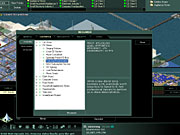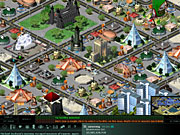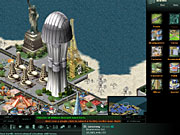It almost seems like you could make a massively multiplayer online game out of just about anything, but the most successful games of this sort are all role-playing games, so it's a bit unusual to see a massively multiplayer game that involves neither elves nor space elves. Legacy Online from Oceanus Communications is essentially a massively multiplayer strategy game--one in which most essential decisions are made by the player in isolation, with only limited input from other players. This changes as you progress to the high levels of the game, where you start to become involved in politics, but it definitely offers something to those players who just want to plug along, churning out goods and services for faceless citizens whom they never see, and whose absence makes the world of Legacy Online seem a bit sterile. (Though it turns out that the game lets you import your own portraits, so if you had your heart set on playing as a space elf, you could at least make that happen, technically.)

The mechanics of Legacy Online are fairly straightforward. You choose a company (which confers certain abilities, like the ability to sell cars instead of groceries, for instance), pick a city, and start building retail outlets. Each outlet will generate a profit (or loss) per hour based on factors too numerous to mention--and most likely too numerous for a novice player to account for. As you expand your empire, you'll need to build factories to produce your goods and warehouses to store them, and you'll have to monitor important factors like your supply chain, individual location profitability, wages, employment, advertising, and more. It's a system that veteran economic strategy game players will recognize from games such as Capitalism and Entrepreneur, and one that normal people will recognize from real life.
The game's goal is the acquisition of money and "prestige points," which collectively let you advance from one level to another. As you gain levels, you'll be able to expand your empire though further construction (since you have a level-based "cap" on how many buildings you can build and control). You are also rated for the dominance you establish in your particular industry. Once you advance far enough, you can run for mayor of your city, or president of the planet. There are multiple planets in the Legacy Online universe, each with multiple cities.
The thing that distinguishes Legacy Online from almost all other massively multiplayer games is that you don't have to be logged in to progress. Your businesses will continue to generate revenue for you, regardless of your connection (or lack thereof). Consequently, you never really need to force yourself to make time for the game in order to advance yourself. After a few days away from the game, you'll simply have accrued more money to use to improve your existing position, so it's possible to play less and do more in some cases. Of course, if you want to sit and fiddle with the game obsessively, you have that option as well. The problem with this is that unlike in other online games, where there is always something to do (something repetitive, usually, but something), in Legacy Online, those who play for a long time in a single sitting will receive diminishing returns on their time. That's because at this point, Legacy Online is fundamentally a one-dimensional game.

While the whole premise of the game is building a business empire, you handle the business aspect almost solely from a chief operating officer's point of view. That is, the business decisions you make are all operational: what to produce; who to sell it to; where to build your stores, factories, and warehouses; and so on. There really isn't any kind of financial strategy, and even though Legacy Online is a game about capitalism, it has no capital markets at this time. No stock market, no bond market. If you want to raise money for your company, you have to take out a loan from the central bank, so in a sense, the game is really more of a simulation of Gorbachev's Russia.
Since Legacy Online doesn't have any financial markets, the game's focus on operations more or less makes up its core gameplay, and while these operations are interesting in many respects, there are two problems. The first is that for all the possibilities the game offers, it really doesn't offer that much to do. You build businesses, supply them, and make money. You can commission various technological advances (for example, if you operate a chain of music stores, you can "research" listening stations), but these function simply as game mechanics and don't provide any tangible rewards. The technologies generally represent trade-offs between efficiency and desirability, and as you progress through the game, it becomes a challenge to keep your massive empire efficient. The challenge is in the micromanagement, and while your empire can always use more tweaking, at some point it becomes just another thing to do.

The second problem is that the interface seems to have been designed to give you the least possible information per mouse click. The information is all there, but it's squeezed into small tabbed screens that beg for better organization. There are important locational variables on the maps (such as the condition of the different neighborhoods, the type and quality of the residential areas near your stores, and the zoning of the various lots) but finding the information you need quickly isn't easy. On the other hand, the game's pace is so languid that you rarely need to find out anything quickly.
In fact, you could almost play Legacy Online entirely from a spreadsheet-style interface, as is the case with nearly all business management games. Yet so many massively multiplayer games depend on a sense of place--an actual location in which players can immerse themselves--and Legacy Online doesn't connect you to its world. While you'll find yourself clicking on and moving around the maps, everything seems strangely homogenous. The cities don't really have any character to them. The game suffers further from unremarkable graphics and sound, and you may find yourself using the "track library" function to play your own MP3s in place of the game's music.
In a way, Legacy Online seems like the ultimate game for casual players who don't want to commit a lot of time and effort. You can log on, fiddle with something, and then log off, and you'll have more stuff when you get back (unless, of course, your supply chain breaks while you're offline). A decent company isn't going to go broke overnight, or even over two or three nights, so you really can play when you want. Unlike in other massively multiplayer games, you won't have to wait for other players, or be forced to group with other players to advance, or anything like that. The game's community is friendly, helpful, generous, and generally low-key. It's a good place to hang out for a while and fiddle with some buttons, yet it doesn't seem very compelling at this point. But it might be so for some players, and the fact that the game is freely downloadable with a free two-week trial (followed by a monthly rate of $9.95) means you can try it without any out-of-pocket cost.

The game does have some good ideas, but they need to be fleshed out before the game has a chance of really becoming addictive. The developer could add more game mechanics, but while these new additions might make the game more interesting, they'd also make the game more complex--possibly too complex for new players. Legacy Online is balanced well for casual players who don't want to make large time commitments to the game, yet it's this same balance that ultimately keeps the game from being truly compelling at this point in time.